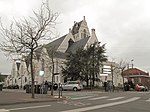Wervicq-Sud
Belgium–France border crossingsCommunes of Nord (French department)French FlandersPages with French IPA

Wervicq-Sud (French pronunciation: [wɛʁvik syd]; Dutch: Zuid-Wervik) is a commune in the Nord department of northern France, near the border with Belgium. Wervicq-Sud is one of the oldest villages still existent, dating back to Roman times. The town is separated from its Belgian Flemish sister town of Wervik by the river Lys. Located 15 km north of Lille and 20 km south of Ypres.
Excerpt from the Wikipedia article Wervicq-Sud (License: CC BY-SA 3.0, Authors, Images).Wervicq-Sud
Hameau de la Lys, Lille
Geographical coordinates (GPS) Address Nearby Places Show on map
Geographical coordinates (GPS)
| Latitude | Longitude |
|---|---|
| N 50.7731 ° | E 3.0486 ° |
Address
Hameau de la Lys
Hameau de la Lys
59117 Lille
Hauts-de-France, France
Open on Google Maps









